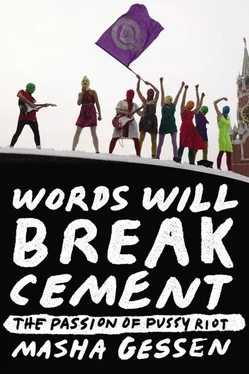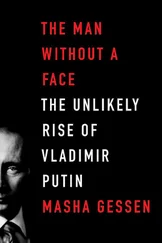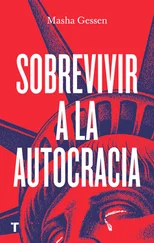A few other artists were struggling with the same issues. Petya had spent some months helping the performance artist Oleg Kulik mount a large collaborative show called I Believe. The show was preceded by a series of collective soul-searching sessions during which each participant strove to identify what he believed in. Petya found this approach unnervingly and embarrassingly modernist. Here was another complication: these philosophy students (and one physicist) wanted to use their intellectual tools to deconstruct what they were confronting, but the shifty and shifting language resisted deconstruction. In the summer of 2007, they went to see Prigov.
———
PRIGOV LIKED THEM—of course he did—and happily agreed to perform with them. This was to be Voina’s first real action, after six months of talking all the time, and once throwing cats (actual live stray cats) over the counter at McDonald’s in a joint action with the art group Bombily (“Gypsy Cabs”), which was really just Kulik’s stepson Anton Nikolaev, a former student who emailed me links to footage of Voina’s actions. Voina called him the Crazy One.
Prigov was going to get inside a fireproof metal safe and Voina members were to carry the safe with the poet up twenty-two floors in the main building in Moscow State University. The entire time, Prigov was to be in conversation with himself, presumably in his usual melodic, prayerlike manner. He wrote a piece to launch his monologue:
The image of him who sits in the closet, in a shell, in a case, is long familiar. He has gone into hiding, he has gone underground, he is doing his work in secret; the work of his soul and of his spirit is concealed from outside view. He is like Saint Jerome in his cave when the ray of Providence enters to take him up to the heavens. So has the man in the closet waited long enough for the moment of his ascension, when he shall be taken up to the twenty-second floor and this shall be his reward for the pain and suffering inflicted by the world and for the feats of his spirit, as yet undisclosed. No plain worker of the ordinary physical world—no one whose job it is to transfer regular physical or fleshly burdens from one place to another—could be entrusted with the labors of this ascension. It would be a day’s work for them, whether their remuneration was miserly or generous. No, the higher power demanded the untrained hands of those for whom this labor would be a heroic feat, the work not of muscle but of soul and spirit.
The piece was called Ascension and reflected the spirit of excessive symbolism with which Voina would imbue its first action. Moscow State University’s main building, one of seven Moscow skyscrapers modeled on the Manhattan Municipal Building in a blatant act of architectural plagiarism, is one of the city’s tallest buildings, sitting atop its highest hill. So the top of that building is truly as high as one could rise in the Russian capital. Several thousand gulag inmates were used in the construction of the building, and the twenty-second floor actually housed a temporary lagpunkt (labor camp unit) when work inside the building was under way. Although the philosophy department was located in a different building, the main building still symbolized all of the university—and all of Russian education, and all of Russian knowledge, and much of Russia’s ambition. And it would be by the tender, untrained hands of former and current Moscow State University students (not unlike the untrained hands of inmates who had built the university) that Dmitry Aleksandrovich Prigov would finally be installed at the pinnacle of Russian culture, albeit in a fireproof safe.
They could not find a fireproof safe. They decided to make do with an oak wardrobe—homey and not as heavy as a safe, but a solidly symbolic enclosure still. On July 6, 2007, Voina waited for Prigov in a Moscow bookstore café. Prigov was two hours late.
The he called, laughing: “I have somehow landed in a hospital. I’m in intensive care.” Voina went to see him. He seemed to think the whole thing was pretty funny, and so did the young people who crowded around his bed: they were willing to think whatever Prigov thought. Ten days later, Dmitri Alexandrovich Prigov, aged sixty-six, died in the hospital.
Voina had a wake. Instead of ascending to the twenty-second floor, they descended into the Moscow Metro—another symbol of Soviet monumentalism and architectural gigantism. They boarded the circle line at the scarcely inhabited midnight hour and quickly set up red plastic picnic tables, which fit perfectly between the benches that run along each side of the subway car. They covered the tables with white tablecloths and rapidly distributed place settings, bottles of wine and vodka, and traditional Russian bitter and sweet wake fare. Anton the Crazy One approached other passengers to offer them food and drink (all declined). Oleg Vorotnikov recited an early Prigov poem:
My ambition is serving as compost
For the future, more rational sort,
So a youth, full of merit and purpose,
Grows tall in my fertilized dirt,
So a youth, incorruptibly, proudly
Has disdained shady foreigners’ pay,
Realizes all madness around him,
Yet declares “I love you,” come what may. [2] Translation by Gregory Zlotin
“It was a total installation,” Petya told me, using a term coined by the émigré Russian artist Ilya Kabakov to describe installations that represent segments of a larger narrative. “It was our first experience of working with public space, intended to bring life into it. The Conceptualists pushed the boundaries of language and we pushed the boundaries of public space.”
The Wake , or The Feast , as Voina named it, is my favorite among their actions because it was heartbreaking. There were about a dozen people at the picnic tables. They were very young and amped up, like kids who are having a party while their parents are out of the house. They looked shaken, small, and alone—exactly the way people feel when someone they love has died. They succeeded in capturing the very essence of a Russian wake, a party of maudlin abandon. Or rather, they captured the spirit of the post-Soviet wake, which, like most post-Soviet rituals, combined a memory of Russian traditions with bits of Soviet officialdom. It was a perfect tribute to Prigov. It was also a perfect preview of the future of Voina, which would become best known for making the private public.
Voina videotaped the action and, as it would do with all its actions in the future, edited it into a short clip with an accompanying text narrative. The video made it into a show in Kiev, and Voina went there and even restaged The Feast on the Kiev Metro. They were a bona fide art group now.
———
ONCE THEY RETURNED FROM KIEV, they launched a series of actions that had the cumulative effect of making people feel as if Voina had been around for a while, commenting on Russian life and politics without mercy. On February 29, 2008, five couples had sex in the Biology Museum and videotaped it. The action was called Fuck for the Heir Puppy Bear , a play on Dmitry Medvedev’s last name, which derives from the Russian word for bear. Medvedev, a tiny man who looked like a cross between a third grader and his favorite stuffed toy, had been anointed Putin’s successor; the day after the action, he was elected to the office of president so he could keep the chair warm for Putin for four years. The location for the action was chosen for its animal associations, while the form was meant to communicate that Russian political life was like pornography: the commercialized imitation of passion.
In May, Voina staged The Humiliation of a Cop in His Home : pretending to be students delegated by local high schools, they entered police precincts and replaced portraits of Putin with ones of Medvedev. Policemen watched, mortified at having to witness what felt like an affront to the regime but unable to act because formally the “high school students” were doing the right thing: Medvedev was being inaugurated that very day.
Читать дальше












